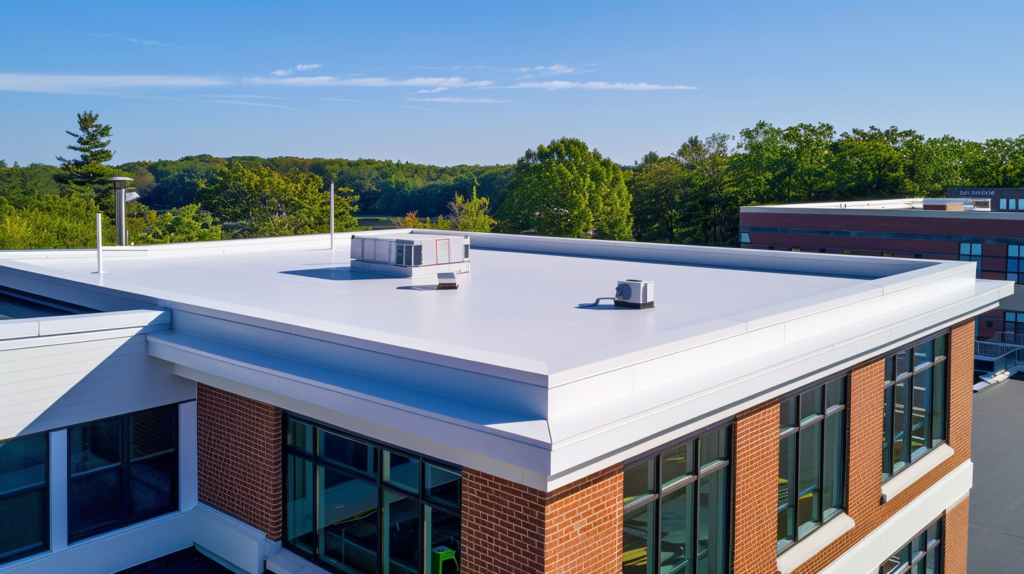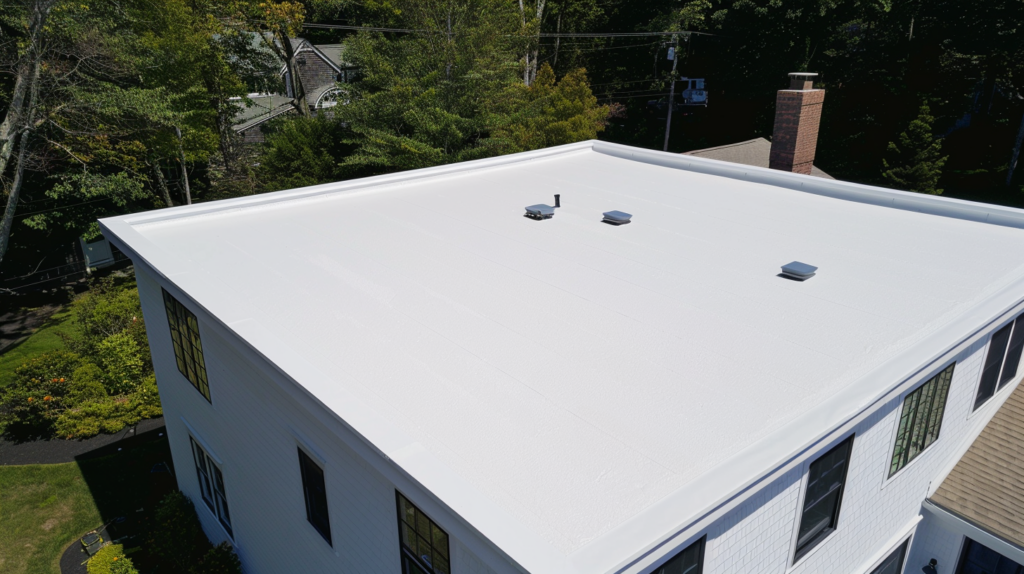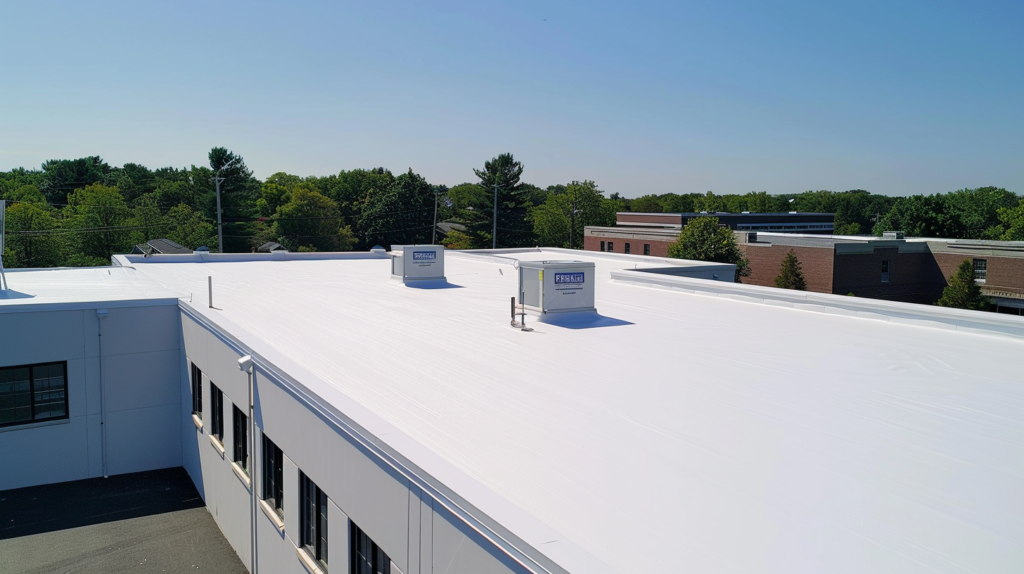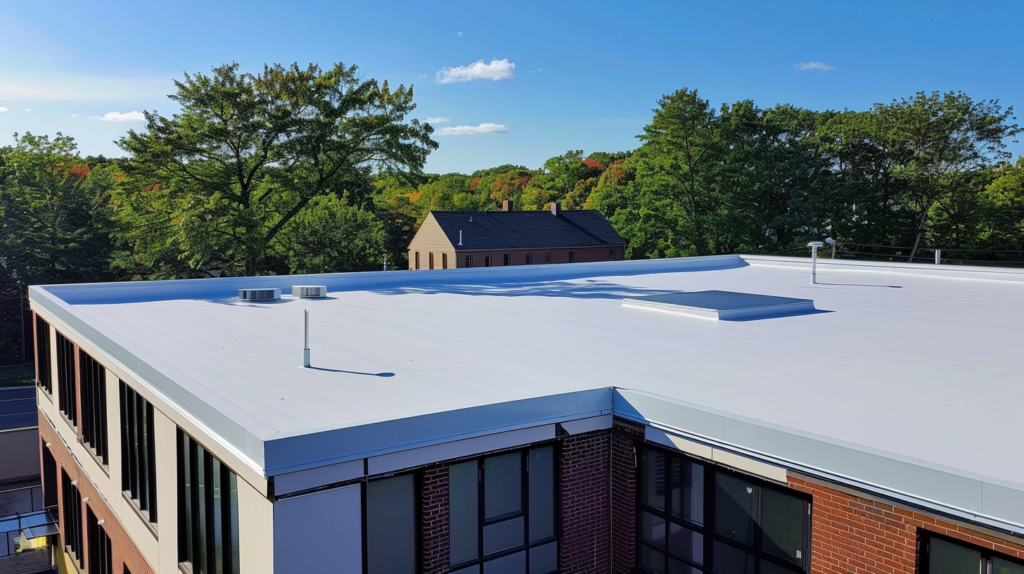Flat Roof Replacement Costs: Updated 2024 Guide
Reading Time: 10 minutesAre you planning a flat roof replacement? Understanding the costs involved and what to expect helps you make an informed decision. This updated guide for 2024 breaks down the expenses and factors that affect the price of replacing a flat roof, providing you with the knowledge you need to budget effectively. Get ready to unravel the updated costs in 2024 and make an informed decision for your roofing project!
Key Takeaways
- Flat roof replacement costs in 2024 range from $3,000 to $20,000, and material choices like PVC, TPO, and EPDM influence the final price tag.
- Flat roofs offer lower material and labor costs, energy efficiency, and suitability for green initiatives, although challenges like water pooling and drainage issues must be managed.
- Hiring a professional for flat roof replacement ensures adherence to safety standards, accurate installation, and potential insurance coverage, outweighing the short-term savings of a DIY approach.
Introduction
Imagine transforming your home with a stylish and functional flat roof – a choice that marries the elegance of modern design with the practicality of space utilization. However, before moving ahead, it’s vital to understand the financial aspects of flat roof replacement clearly. With longevity that can stretch up to three decades with proper care and various materials tailored to your specific roofing needs, the investment in a flat roof is as much about value as it is about aesthetics. Get ready to unravel the updated costs in 2024 and make an informed decision for your roofing project!
Understanding Flat Roofs

Delving into the realm of flat roofs, we uncover a world where functionality meets sleek design. Characterized by minimal slope, flat roofs are standard atop commercial buildings and residences. But what exactly goes into a flat roof, and why are they so prevalent?
Unveiling the layers, we explore what makes flat roofs attractive, their benefits, and their everyday challenges – all key factors influencing the cost of replacing a flat roof.
Benefits of Flat Roofs
Flat roofs are the unsung heroes of the roofing world, offering more than just a barrier against the elements. Flat roofs typically are a cost-effective solution with lower material and labor costs than their pitched counterparts. These roofs are energy savers, optimizing space for green initiatives like rooftop gardens and solar panels, making them friendly to your wallet and the environment.
Adopting flat roofs might result in substantial savings on utility bills, especially in hotter regions where energy efficiency is paramount.
Common Issues with Flat Roofs
Despite their advantages, flat roofs come with their own set of challenges. Some of these challenges include:
- Water pooling, which can lead to leaks and shorten the roof’s lifespan compared to pitched roofs
- Lack of proper drainage systems, which can exacerbate water pooling issues and cause costly water damage in colder climates
- Potential problems with rooftop gardens, as invasive plant roots can cause damage over time
Cost Breakdown of Flat Roof Replacement
The cost of replacing a flat roof can vary widely, just like the roofing material available in the market. With flat roof costs ranging between $3,000 to $20,000 for most homeowners, the final figure will reflect material choices, labor, and any additional expenditures that might arise.
Whether your preference is for PVC, TPO, or EPDM roofing or you’re considering the cost of removing the old roof, comprehending the cost breakdown is key to planning your budget for your new flat roof.
Material Costs
Material costs for a flat roof can vastly differ based on your roofing material choice. Flat roof material cost ranges from the modestly priced fiberglass or GRP roofing starting at $4 per square foot to the higher-end metal roofing that can soar up to $30 per square foot, options abound. It’s a spectrum where the average cost hovers around $4 to $13 per square foot, allowing you to pick materials based on both budget and preference.
Labor Costs
Labor costs in flat roof replacement hold significant importance. Depending on the complexity of the installation, homeowners can expect to pay anywhere from $3 to $7 per square foot. Specialized roofing techniques, like using ballasted or fastened attachment methods, also play a role in determining these costs. While the hourly rates for roofers range from $40 to $80, it’s the intricate details, like limited roof accessibility that may require additional expenses when hiring a roofing contractor.
Additional Costs
Unforeseen additional costs may arise during the process of flat roof replacement. Some potential extra costs to consider include:
- Permitting requirements and local building codes can weigh anywhere from $100 to $500.
- Adding or replacing a drainage system can cost an extra $600 to $1,000.
- Disposal fees for your old roofing materials can also be added up.
It’s important to consider these potential costs when budgeting for your flat roof replacement project.
These unexpected expenses can influence the total cost of your new flat roof roofing project.
Flat Roof Materials and Their Costs

Selecting the appropriate roofing material is a significant decision during flat roof replacement as it influences the look, durability, and price. From sturdy and affordable fiberglass roofing to luxurious and impactful metal roofing, the range of options can cater to any style and budget.
While the built-up roofing systems remain among the most cost-effective choices, the choice ultimately boils down to factors like the expected lifespan, maintenance requirements, and environmental impact of the material.
PVC Roofing

PVC roofing stands out in the flat roof market for the following reasons: cost-effectiveness, durability, resistance to various elements, and ability to reflect sunlight, making it an environmentally conscious roofing material option.
- Cost-effectiveness ranging from $4 to $7 per square foot
- Durability that can last up to 40 years
- Resistance to various elements, from water to fire
- Ability to reflect sunlight, making it an environmentally conscious option
- Economical option for homeowners seeking a balance between cost and quality.
TPO Roofing
TPO roofing is another heavyweight contender in the flat roof arena, known for its heat-reflective properties and rubber roofing material efficiency. With an installation cost that can range between $5,200 and $21,000, and a lifespan of 20 to 25 years, TPO roofing is an investment that pays off in energy savings over time.
This material ensures peace of mind as it works continuously to reflect heat.
EPDM Roofing

EPDM roofing offers a classic look that doesn’t compromise on quality. This roofing material is derived from oil and natural gas byproducts, marking it as a sturdy choice for those in need of a resilient roofing solution. Some key features of EPDM roofing include:
- Black and white color options
- Durability and resistance to weathering
- Flexibility and ease of installation
- Energy efficiency and UV resistance
Consider EPDM roofing for your next project to enjoy these benefits and more.
EPDM, which costs between $4 and $13 per square foot, can meet various budget requirements while promising a roof built to last.
Factors Influencing Flat Roof Replacement Costs

Numerous factors affect the overall cost of replacing a flat roof. Each element plays a crucial role in the final price tag, from the specific roof type and its complexity to the existing roof’s condition. Moreover, regional variations in material costs and labor rates can cause significant differences in pricing.
The blend of these factors will ultimately establish the total cost of your flat roof replacement roofing project.
Roof Size and Accessibility
The dimensions of your roof directly affect the replacement cost, as larger roofs demand more materials and labor. Accessibility is another cost factor; the easier it is to access your roof, the lower the labor costs will be.
Calculations are often made in roofing squares – each covering 100 square feet – to estimate the required materials, so understanding your roof’s dimensions is critical to anticipating the cost implications.
Existing Roof Condition
The condition of your existing roof could either reduce or increase the replacement cost. If your existing roof can support an overlay, you may save on removal costs. However, extensive damage, especially to the underlying structure or due to water intrusion, will incur additional costs.
Assessing the existing roof condition is vital to avoid any financial surprises during the replacement process.
Regional Variations
Where you live can significantly influence the cost of replacing a flat roof. The cost may vary depending on where you live. Different states may have unique building codes that affect material and installation requirements, influencing the overall cost. Additionally, the cost of living in your area will influence labor rates and, consequently, the overall replacement cost.
It’s essential to research local market conditions to get an accurate estimate of the potential expenses.
Comparing Flat Roof Replacement to Other Roofing Types
When comparing the costs of flat roof replacement with other types of roofing, it’s evident that flat roofs provide a cost-effective alternative. Whether you’re considering transitioning from a flat to a pitched roof, which can be costly, or exploring alternative materials like asphalt shingles, clay tiles, or metal roofing, understanding the cost differences can guide you to the most financially sensible choice for your home. Various roofing alternatives, such as asphalt shingles, clay tiles, and metal roofing, offer different levels of performance and cost, making it essential to compare these options carefully.
Flat vs. Pitched Roofs
The debate between flat and pitched roofs often concerns cost and architectural preference. While flat roofs are generally more affordable due to their simplicity and reduced material needs, pitched roofs command a higher price due to their complexity and the safety concerns associated with their installation. Some homeowners favor the modern look of flat roofs, while others prefer the traditional appearance of pitched roofs. It’s a trade-off between the straightforward, economical approach of flat roofs and the traditional, but potentially costlier, pitched roofs.
Alternative Roofing Options
Beyond flat and pitched roofs, homeowners can consider other roofing material options like the ever-popular asphalt shingles, which offer a cost-effective solution for those on a budget, or the longevity of clay tiles and metal roofing, which, while pricier, may offer savings in the long run due to their extended lifespans and potential insurance benefits. Asphalt shingles are particularly popular among homeowners looking for an affordable yet reliable roofing option. Each option presents a unique set of cost and performance characteristics that should be weighed carefully.
DIY Flat Roof Replacement vs. Hiring a Professional
The choice between DIY flat roof replacement or hiring a professional is serious. While the former might appear as a chance to cut down labor costs, the latter guarantees professional knowledge and minimizes the chance of expensive errors.
Selecting a reputable roofing contractor ensures quality work and adherence to safety standards. Armed with the right knowledge, tools, and a healthy respect for the complexities of roofing, you can make an informed choice that aligns with your budget and skillset when selecting a roofing contractor.
DIY Flat Roof Replacement
Embarking on a DIY flat roof replacement could be a budget-friendly option, with costs mainly associated with materials. However, it’s a path fraught with potential pitfalls – from lack of professional safety training to the risk of voiding warranties and insurance coverage. Without the right roofing tools and knowledge, you may make costly mistakes. Carefully weigh the immediate savings against the long-term risks before deciding to go with flat roof replacements.
Professional Flat Roof Installation
Choosing professional flat roof installation offers several benefits:
- Higher initial costs, but ensures accurate and efficient work
- Adherence to manufacturer standards and local building codes
- Insurance coverage for accidental damages
- Quicker turnaround, minimizing exposure to the elements
- An installation warranty can provide peace of mind by covering potential issues that may arise after the installation

Maintenance and Longevity of Flat Roofs
The lifespan of a flat roof is directly tied to the maintenance it undergoes. With lifespans ranging from 15 to 30 years, proactive measures such as regular inspections, debris removal, and ponding water can extend the life of your roof.
A roof coating can enhance durability and waterproofing capabilities, while proper insulation maintains energy efficiency.
Regular Inspections
The adage ‘an ounce of prevention is worth a pound of cure’ rings true for flat roofs, which typically have a lifespan of 12–15 years. Consistent visual inspections, particularly after harsh weather, can help spot potential issues before they worsen. Scheduling professional inspections annually ensures that even the most elusive issues are caught early on, preventing hefty repair costs.
Keep a watchful eye on your roof’s flashings, drainage systems, and edges – these are often the first to show signs of wear and tear. Checking roof flashings for signs of wear and tear is crucial, as they are often the first areas to show damage.
Preventive Measures
Preventive maintenance for flat roofs goes beyond regular inspections. A high-quality roof sealant can shield your roof from climate damage and improve resistance against water. While the cost of sealant can vary, it is an investment in your roof’s future.
Additionally, keeping the surrounding environment in check, such as trimming overhanging branches, can prevent physical damage and drainage clogs, safeguarding the longevity of your flat roof.
Summary
In summary, whether it’s the sleek appeal of a PVC roof or the robustness of EPDM, flat roofs offer an array of options to suit any style and budget. With factors like material costs, labor, roof size, and regional variations, replacing a flat roof is as individual as the homeowners themselves. Remember, investing in professional installation and regular maintenance can extend the lifespan of your flat roof, making it a wise and cost-effective choice for years to come. Embrace the flat roof revolution with confidence, knowing you’re well-equipped with the knowledge to make an informed decision.
Frequently Asked Questions
Flat roof replacements typically cost around $9,000, but depending on various factors, they can range from $3,000 to $20,000. Get ready for a range of options to fit your budget and needs!
No, it’s not recommended that you install a flat roof yourself. It requires specific skills and tools, and you may damage the roof and incur higher costs in the long run.
The most affordable roofing materials for a flat roof are fiberglass or GRP roofing and modified bitumen roofs, starting at $4 per square foot. However, built-up roofing systems are also a great cost-effective option!
To extend the lifespan of your flat roof, regularly inspect it, clean debris and gutters, apply roof coatings, ensure proper insulation, and promptly address ponding water and potential leaks. These steps will help your flat roof last longer!
Yes, hiring a professional for flat roof installation is worth it to ensure proper sealing and adherence to building codes and manufacturer standards. Don’t risk costly issues – go pro!
Denis is the driving force behind ID Flat Roof, a leading company in Boston specializing in flat roof repair and installation for over 20 years.
Expertise:
Denis excels in PVC, TPO, EPDM, and rubber roofing. His meticulous approach ensures quality and customer satisfaction.
Innovation:
Denis incorporates cutting-edge solutions like skylights and solar PV roofing.



